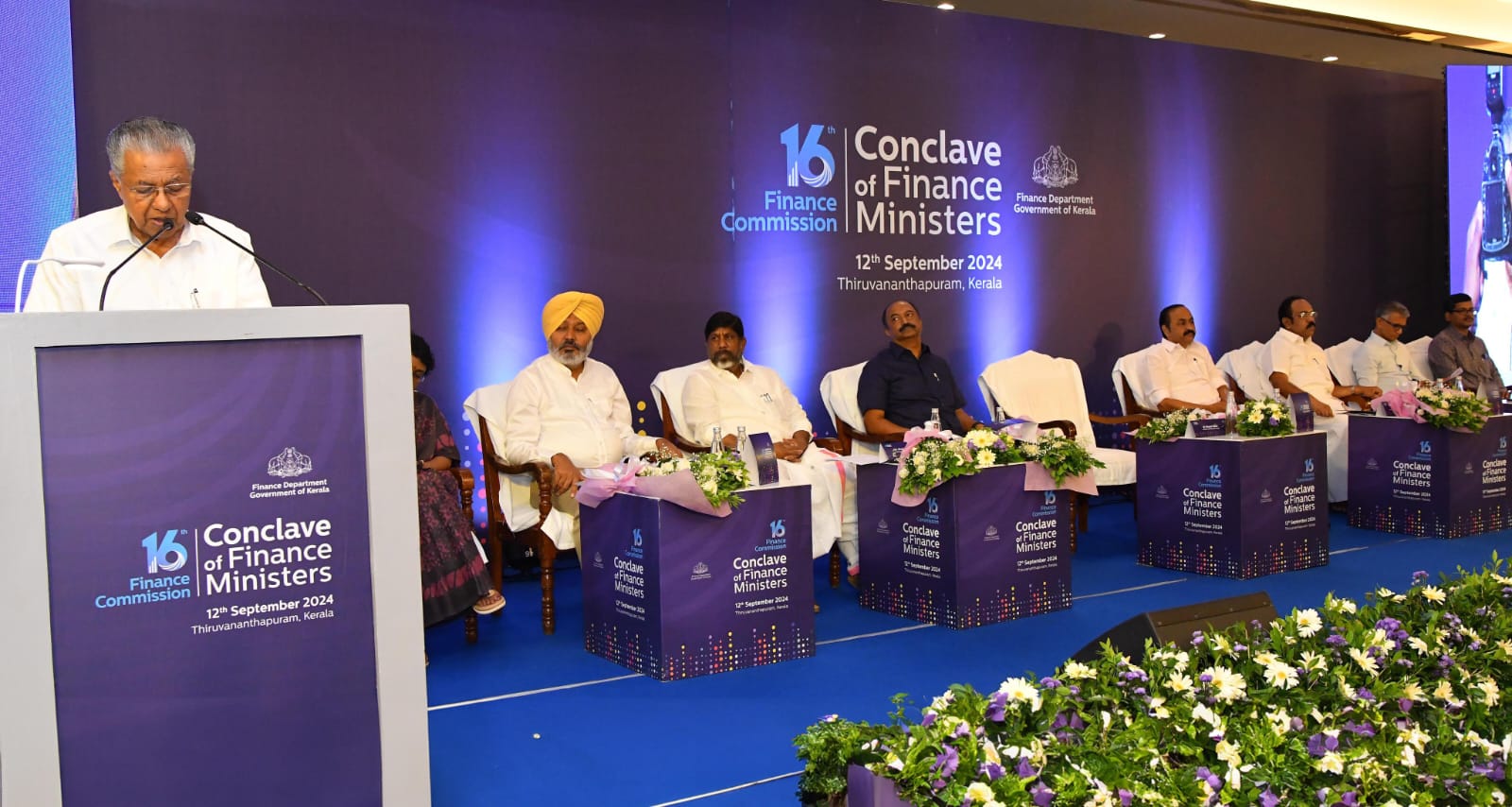Published Sep 12, 2024 | 10:30 PM ⚊ Updated Sep 12, 2024 | 10:30 PM

Kerala CM Pinarayi Vijayan leads conclave of states on fiscal federalism. (X/Pinarayi Vijayan)
In a high-stakes gathering held in Kerala’a capital city Thiruvananthapuram on Thursday, finance ministers and representatives from four states came together to address growing concerns over the imbalance in fiscal resource distribution by the central government.
The conclave, hosted by Kerala, demanded a more equitable approach to federalism, emphasising the urgent need for a recalibration of the fiscal relationship between the Union and the states.
As the 16th Finance Commission gears up for its recommendations, the ministers laid out a roadmap for what they see as a necessary reformation in India’s fiscal federalism.
A significant concern voiced during the conclave was the widening economic disparity between states, a gap exacerbated by skewed resource allocation from the Centre.
Telangana’s Deputy Chief Minister and Finance Minister, Bhatti Vikramarka Mallu, pointed to the risk of stifling better-performing states through reduced allocations.
He argued that the absence of incentives for states excelling in economic and social sectors could create a dangerous scenario. “Better-performing states are likely to see diminished progress and efficiency with declining funds. The Centre must recognise good performance and impose limits on excessive redistribution,” he stressed.

Chief Minister Pinarayi Vijayan during the Conclave of Finance Ministers
Mallu’s comments highlight a growing discontent in states like Telangana, which feel that their contributions to the national exchequer are not being adequately acknowledged.
The need for a more calculated and performance-based approach to resource distribution was echoed by other ministers at the conclave, with a demand that states receive at least 60 percent of their tax contributions back from the Centre.
The remaining 40 percent, according to the ministers, should be redistributed, but in a way that ensures fairness while encouraging higher performance.
A central theme running through the discussions was the implementation of the Goods and Services Tax (GST) and its impact on state revenues.
Punjab Finance Minister Harpal Singh Cheema raised concerns about the end of the GST compensation period, which has left several states, especially agricultural ones like Punjab, in dire straits.
“Punjab today faces a revenue loss of ₹20,000 crore annually. This is primarily due to the state’s pre-GST revenue base being agricultural, and the reforms have severely cut into our revenue streams,” he noted.
Cheema also drew attention to another key issue—delays in the central government releasing funds related to centrally sponsored schemes.
With Punjab already grappling with geographical challenges as a border state, such delays further weaken its financial health, impeding its ability to function effectively. The GST issue, therefore, is not just a fiscal problem but a broader issue of states’ fiscal autonomy being jeopardised.
Tamil Nadu’s Finance Minister, Thangam Thenarasu, reflected on the steep decline in the state’s share of central funds over the years.
From receiving 7.931 percent of the Centre’s allocations during the 9th Finance Commission, Tamil Nadu’s share has plummeted to 4.079 percent under the 15th Commission.
“This puts significant financial pressure on states that are already performing well. The federal system should not penalise success but support it,” Thenarasu remarked, raising concerns about how the overemphasis on redistributing resources to poorer-performing states could curtail development in more advanced regions like Tamil Nadu.
Thenarasu’s argument reveals a deeper issue within the current system—while redistribution aims to reduce disparities, it has not yet yielded the desired development in lagging states. Instead, it risks undermining the efficiency and progress of states that are already setting benchmarks in growth and development.
The use of cess and surcharges by the central government emerged as a common grievance. Karnataka’s Revenue Minister Krishna Byre Gowda criticised the Centre’s growing reliance on these tools, arguing that they divert funds away from the divisible pool and worsen economic inequalities.
Karnataka, which contributes significantly to the national GDP, is facing a loss of approximately ₹22,000 crore annually due to the GST regime. Byre Gowda proposed capping cesses and surcharges at 5 percent, with anything beyond that included in the divisible pool, ensuring a fairer distribution of resources.
Karnataka’s position reflects the sentiment of several states that while redistribution is essential, it should not come at the cost of high-performing states. A more balanced fiscal system, they argue, will not only ensure fairness but also foster collective national development.
At the same time, Kerala Finance Minister K N Balagopal emphasised two key objectives behind convening the finance ministers’ conclave.
The first is to draw national attention to the worsening imbalances in the country’s fiscal system. The second is to gather broad-based consultations on the state’s memorandum to be submitted to the 16th Finance Commission.
Highlighting the growing vertical imbalance, Balagopal pointed out that the share of unconditional grants from the Finance Commission to the states has significantly declined, dropping from 31.2% in 2009-10 to just 17.4% in 2023-24.
He called for recognising the critical role of state governments in tackling major developmental challenges and contributing to nation-building.
To address the imbalance, he stressed that the states’ share in the divisible pool should be increased to at least 50%, and a ceiling should be placed on the share of cess and surcharges at a maximum of 5%.
The conclave underscored a central issue—India’s current fiscal federalism is at a crossroads. The ministers collectively voiced concerns that without major reforms, the existing system could inhibit both state and national progress. They argued that federal equity is not just about redistribution but about recognising performance, ensuring fairness, and upholding the fiscal autonomy of states.
According to Finance Department officials, the 16th Finance Commission, therefore, faces a formidable challenge: how to balance the need for redistribution with the imperative to foster growth in well-performing states.
The conclave’s recommendations, especially the call for capping cesses and surcharges and rewarding better-performing states, reflect a growing demand for a federal system that truly respects both equity and efficiency.
(Edited by Ananya Rao)

